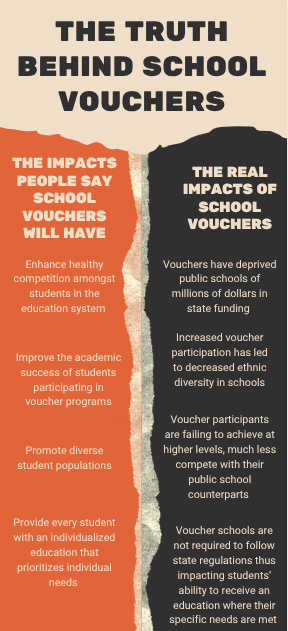I fear for the future of public education, especially West Ottawa. Ever since President-Elect Trump announced bringing Betsy Devos to the U.S. Government as the Secretary of Education, the subject of charter schooling is in the spotlight.
Charter schooling is a type of privatized schooling in which private organizations run schools that are publicly funded in order to turn a profit, in belief that schools could run more efficiently if there were competition. Today, charter schools are the biggest alternative to public schooling. Devos is a large advocate for charter schooling, so the U.S. will undoubtedly see some changes in educational systems, most definitely in favor of charter schooling; this scares me for a few reasons.
The private companies or organizations that run charter schools have one main goal in mind: turn a profit. While improving the quality of their school can reel in more funds, budget cuts work just as effectively, if not better. There are some simple ways to cut a school’s budget: pay teachers less, eliminate special education services, expel those students who require the most administrative oversight.
Alongside that, charter schools offer less transparency than public schools, since the Freedom of Information Act, the act that allows full or partial disclosure of unreleased information, does not apply to charter schools unless state or federal law dictates otherwise. This means that charters can say as little as they want about the student’s performance, the teacher turnover rates, and more.
In turn, charters show no solid evidence that they outperform public schools as a whole, contrary to popular belief. Sweden, a country that completely privatized their education, was shown to plummet nationally in their PISA scores, PISA being an international assessment that measures knowledge in math, science, and reading among 15-year-olds. Sweden’s results do not put charter schooling in a good light. In America, advocates will argue that charters have good results, better than public schools, but the main reason that charters look promising statistically is because most do not teach a student population comparable to the local public school.
Lastly, and most importantly, charters have the potential to seriously damage public schools. This is why I fear for West Ottawa’s future. Through the expansion of charter schools, public school funding is lost when students opt for a charter school. Constant reductions to a school’s budget is extremely detrimental to the school itself, especially one with lots of programs and extensions to their curriculums, like West Ottawa. When Devos, whose home resides in Michigan, becomes Secretary of Education, it is evident she will act in favor of the charter movement.
To try to ease my fears, I spoke with Buddy Moorehouse, the VP of Communications for the Michigan Association for Public School Academies, or MAPSA. Moorehouse, who is pro-charter, believes charter schools were put into play in the U.S. “to provide an educational alternative for students, and to fill any gaps that might exist in a community’s educational offerings.”
Moorehouse, along with the charter advocates he knows, does not believe that charters seriously hurt public schools and were not installed into education to replace public schools. “We need all types of public schools – traditional and charter – for our educational system to be the best that it can be,” Moorehouse said. Moreover, Moorehouse believes that Devos, if anything, will give more power over education to the state, and federal power will only come into play if it means emphasizing innovation in education.
Lastly, Moorehouse and I debated whether or not charters in Michigan are public schools. He defended charters by raising the points that in Michigan, charters are not exempt from the Freedom of Education Act, and that “they have to take all the same tests, they’re subject to all the same oversight, and they have to file all the same reports.” Moorehouse has optimistic views of charter schooling and he raised good points; he definitely eased some of my worries.
However, I’m still not convinced. Moorehouse has a great philosophy on charters, but some of his claims do not match my research. I believe his claims that Michigan charters can be called public schools, but the claim is debatable, seeing as public schools are mainly implemented by the state and charters are implemented by private organizations that are for-profit.
It still worries me that charters under a Devos education plan might be able to pop up at any time while public schools are only created or expanded according to a district’s population, which leaves room for public schools to be damaged by the redistribution of funds. It still worries me that teacher turnover rates are immense for charter schools due to the amount of work issued for the teachers. It still worries me that Devos is the highest authority when it comes to education; I still do not have a solid idea of what she will do for education, both in Michigan and the U.S. as a whole. I still believe that a broader variety of schools to choose from, as important as Moorehouse makes it out to be, has not worked. It has not worked in Sweden, it has not worked in several urban district school areas, it has not worked in Detroit, so I cannot believe it will work throughout Michigan.
At the end of the day, facts are facts. Facts show that charter schools have grown in numbers nationally in recent years. Facts show that many charter school teachers prefer to work at their local charter than their local public school. Facts show that some charter schools present fantastic statistics about their academic performance. However, facts also show that charters often kick out students that do not perform well and keep the ones that do, which undoubtedly changes the numbers in their favor. Facts also show that teachers are forced to work longer hours, leading to higher teacher turnover. Lastly, facts have shown that when a charter opens in a district, money is redistributed from existing schools to the charter, leading to budget and program cuts in existing schools, leading to additional children leaving their existing schools and taking away more money, leaving existing schools crippled.
Charters are undoubtedly becoming a large topic, especially in Michigan. If students wonder if WO will be affected by a possible increase of charter schools in the same district, all I can say is: look at the facts.






